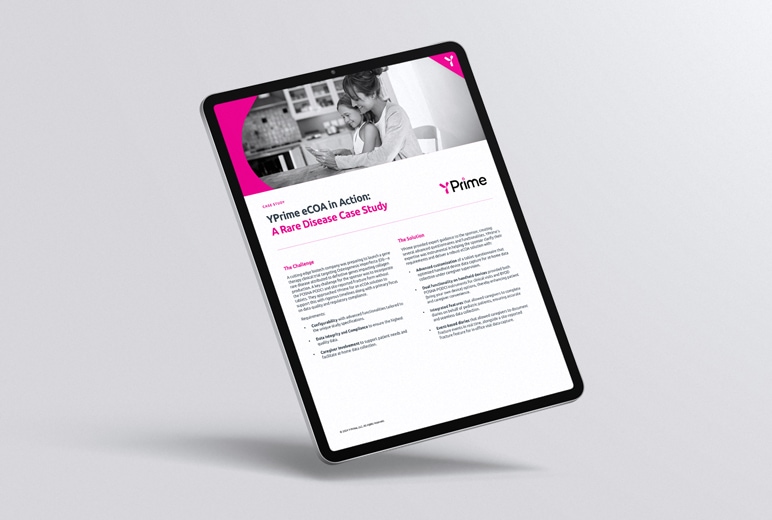The Growing Need for Efficient Pain Management Trials
Pain management trials are among the most time-consuming areas of clinical research, facing unique challenges that significantly extend timelines. With chronic pain affecting nearly one in four U.S. adults according to the Centers for Disease Control and Prevention (CDC), the need for effective therapies is urgent. In 2023, 24.3% of adults reported experiencing chronic pain lasting three months or longer—a prevalence that continues to rise.¹
This public health crisis demands innovative approaches to accelerate research without compromising scientific integrity and data quality. Advanced eCOA solutions for pain management trials are proving instrumental in tackling these challenges—improving data quality, enhancing patient engagement, and eliminating operational inefficiencies to bring much-needed therapies to patients sooner.
Speed matters, but data quality matters more.
Accelerating pain trials requires precision, not just pace—patients deserve nothing less.
Historical Challenges in Pain Management Research
Pain is inherently subjective, shaped by biological, psychological, and social factors. Unlike diseases with clear biomarkers, pain trials rely heavily on patient-reported outcomes, introducing variability that complicates efficacy measurements. This fundamental challenge has historically extended trial timelines.
Traditional pain studies often used paper diaries and simple numerical rating scales, methods prone to recall bias and inconsistent reporting. The placebo effect—particularly pronounced in pain studies—frequently obscured results, requiring larger sample sizes and longer trials to achieve statistical significance.
Regulatory requirements have further extended timelines. The FDA demands comprehensive evidence of efficacy and durability for pain therapies, often requiring lengthy follow-up periods. Additionally, chronic pain studies typically involve diverse patient populations with varying conditions and comorbidities, further complicating recruitment and data analysis.
As pain science evolved, researchers incorporated more sophisticated assessment tools, inadvertently creating additional burdens for patients and sites. This history underscores the need for a paradigm shift in pain research methodology—one that eCOA solutions for pain management trials can help deliver.
How Advanced eCOA Solutions Address Pain Trial Challenges
The unique challenges of pain management trials—subjective reporting variability, significant placebo effects, and operational inefficiencies—have long delayed bringing treatments to patients. Advanced eCOA solutions for pain management trials offer powerful tools to address these issues while maintaining scientific integrity.
Enhanced Pain Measurement and Reporting
Modern eCOA platforms introduce precision and consistency into subjective pain assessments:
These tools improve data accuracy and empower patients to engage more meaningfully in the trial process.

Improved Compliance and Data Quality
Traditional methods often struggle with low patient adherence. Sophisticated eCOA solutions for pain management trials address this through:
These features minimize recall bias and ensure researchers have complete data on how therapies affect patients’ experiences.
Mitigating Placebo Effects
One of the most significant advantages of advanced eCOA platforms is their ability to reduce the impact of placebo effects—a notorious challenge in pain research:
By standardizing how patients report their experiences, eCOA solutions for pain management trials help ensure outcomes reflect true therapeutic effects rather than fluctuating perceptions.
Operational Efficiency
eCOA solutions deliver substantial operational benefits that accelerate trial timelines:
By eliminating manual processes and paper-based workflows, advanced eCOA platforms can dramatically compress study timelines without sacrificing data integrity.
Selecting the Right eCOA Solution for Pain Management Research
Not all eCOA platforms are created equal. When evaluating eCOA solutions for pain management trials, sponsors should prioritize systems specifically designed for this complex therapeutic area with features such as:
The ideal solution delivers these capabilities through a user-centric design that prioritizes both patient engagement and site efficiency.
The Future of Pain Management Trials
The path forward for pain management research lies in embracing innovation while respecting the field’s inherent complexities. Advanced eCOA solutions for pain management trials represent an invaluable tool for addressing the challenges that have historically slowed progress in this critical therapeutic area.
Pain management trials no longer need to be synonymous with inefficiency or delay. With careful planning and adoption of advanced eCOA platforms, clinical operations teams can transform how these studies are conducted—ultimately bringing much-needed therapies to patients faster than ever before.
For actionable strategies designed to reduce timelines while enhancing study outcomes, download this practical guide from YPrime:
Optimizing Pain Management Studies: Your eCOA Platform Playbook
Please also visit the YPrime eCOA page.
Sources
1https://www.cdc.gov/nchs/products/databriefs/db518.htm
Check Out Our Other eCOA Resources
about trial design, data capture, operational efficiencies, and, ultimately, solving for certainty in clinical research.



